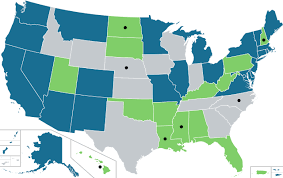States Where Weed Is Legal, The legalization of cannabis in the United States has been a complex journey, marked by significant shifts in public opinion, state laws, and federal regulations. As of 2024, numerous states have legalized marijuana for medical and recreational use, creating a patchwork of laws across the country. This article provides an overview of the states where weed is legal, the scope of legalization, and what it means for residents and visitors.
The Landscape of Cannabis Legalization
Cannabis laws vary significantly from state to state. Some states have fully legalized cannabis for both recreational and medical purposes, while others permit only medical use. A few states still maintain strict prohibitions against all forms of marijuana.
1. States Where Weed Is Fully Legal
As of 2024, 23 states and the District of Columbia have legalized recreational cannabis for adults aged 21 and over. These states allow the purchase, possession, and consumption of marijuana for personal use:
- Alaska
- Arizona
- California
- Colorado
- Connecticut
- Illinois
- Maine
- Massachusetts
- Michigan
- Minnesota
- Missouri
- Montana
- Nevada
- New Jersey
- New Mexico
- New York
- Oregon
- Rhode Island
- Vermont
- Virginia
- Washington
- Maryland
- Delaware
In these states, cannabis products are regulated similarly to alcohol. Licensed dispensaries sell various forms of cannabis, including dried flower, edibles, concentrates, and topicals. Each state has specific regulations governing how much cannabis a person can possess, grow, or purchase.
2. States with Legal Medical Marijuana
In addition to the states with full legalization, several others have legalized marijuana strictly for medical purposes. These states allow patients with qualifying medical conditions to obtain marijuana through a doctor’s recommendation:
- Arkansas
- Florida
- Hawaii
- Louisiana
- Mississippi
- New Hampshire
- North Dakota
- Ohio
- Oklahoma
- Pennsylvania
- Utah
- West Virginia
In medical marijuana states, the regulations vary. Some states allow home cultivation, while others permit only licensed dispensaries to distribute medical cannabis. The conditions that qualify a patient for medical marijuana also differ, ranging from chronic pain and epilepsy to cancer and PTSD.
3. States with Limited or No Cannabis Legalization
Despite the growing trend toward legalization, a few states still prohibit the use of both recreational and medical marijuana:
- Idaho
- Kansas
- Indiana
- Kentucky
- South Carolina
- Tennessee
- Texas
- Wyoming
In these states, cannabis remains illegal, and possession or use can result in criminal charges. However, some states in this category have passed laws allowing the use of cannabidiol (CBD) for certain medical conditions, usually without the psychoactive component THC.
Federal vs. State Laws: Navigating the Legal Landscape
While many states have legalized marijuana, it remains illegal under federal law. The federal government classifies cannabis as a Schedule I substance under the Controlled Substances Act, which defines it as having a high potential for abuse and no accepted medical use. This conflict between state and federal law creates challenges for cannabis businesses and consumers, particularly regarding banking, interstate commerce, and employment.
Despite federal prohibition, the Department of Justice has generally taken a hands-off approach in states with legal cannabis, focusing enforcement efforts on issues like preventing distribution to minors or crossing state lines with cannabis. However, cannabis users and businesses must be aware of the risks associated with the federal status of marijuana.
What Does Legalization Mean for Residents and Visitors?
In states where weed is legal, adults can typically purchase cannabis from licensed dispensaries, possess a certain amount, and consume it in private residences. Public consumption is often prohibited, and driving under the influence of marijuana is illegal across the board. Some states also allow residents to grow a limited number of cannabis plants at home.
For visitors, it’s essential to understand the specific laws of the state they’re in. What’s legal in one state may not be in another, and carrying cannabis across state lines can lead to serious legal consequences. Always research the regulations of your destination before traveling with cannabis.
Conclusion
The movement toward cannabis legalization continues to gain momentum in the United States, with more states likely to join the list of those where weed is legal. As laws evolve, staying informed about the regulations in your state and those you plan to visit is crucial. Whether for medical or recreational use, understanding the legal landscape of cannabis can help ensure a safe and enjoyable experience.
With public support for legalization at an all-time high, the future of cannabis laws in the U.S. will likely see continued expansion and refinement. However, until federal law aligns with state regulations, navigating the complexities of cannabis legalization will remain a challenge for many Americans.
You Might Also Like These:



